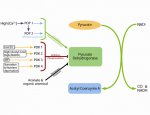Murph
:)
- Messages
- 1,805
The ratio of theory to data on this disease is huge! Sometimes it seems a little comical how often we sift the few facts we have for a new angle.
But I get it. It feels very positive. And for each new person being afflicted/diagnosed, moving through the available information to get (as close as their capacities will permit to) a cutting-edge understanding is a very real process of exciting discovery. (I did a deep dive and exploration process myself within the last year which I found very useful, and I can see my capacities are lower than those of @AdamS !)
But it is not just self-education or amusement. Reseachers (and their spouses!) are involved in this forum and a good theory can make its way back into the system to be tested. So I feel all our theory-making has potential.
What will be truly exciting, however, is when there are so many papers that lay person theory-making can't keep up...
But I get it. It feels very positive. And for each new person being afflicted/diagnosed, moving through the available information to get (as close as their capacities will permit to) a cutting-edge understanding is a very real process of exciting discovery. (I did a deep dive and exploration process myself within the last year which I found very useful, and I can see my capacities are lower than those of @AdamS !)
But it is not just self-education or amusement. Reseachers (and their spouses!) are involved in this forum and a good theory can make its way back into the system to be tested. So I feel all our theory-making has potential.
What will be truly exciting, however, is when there are so many papers that lay person theory-making can't keep up...



